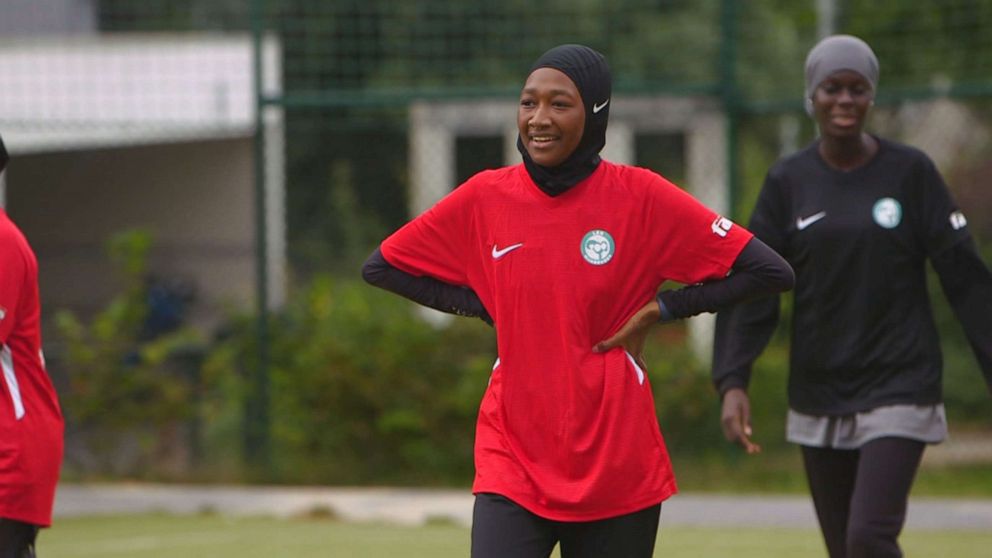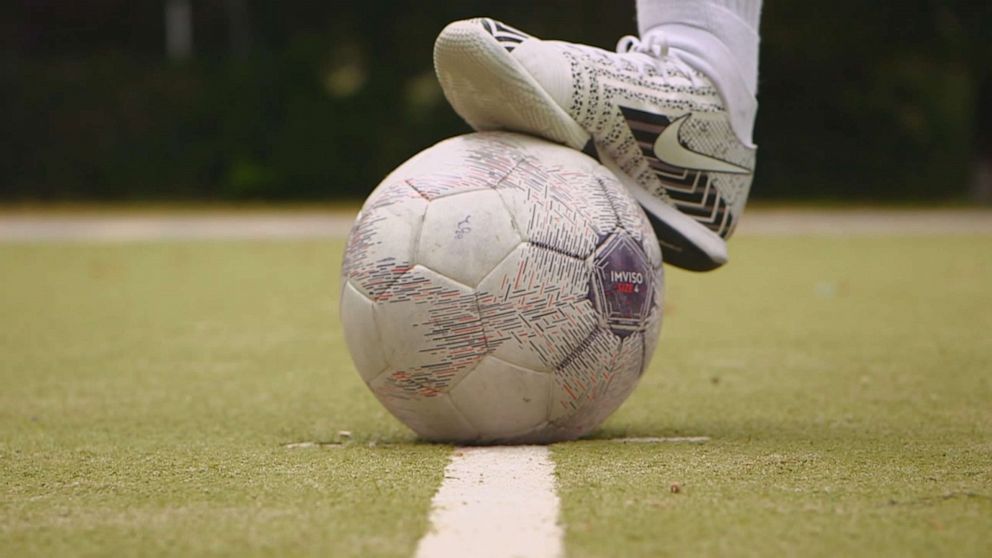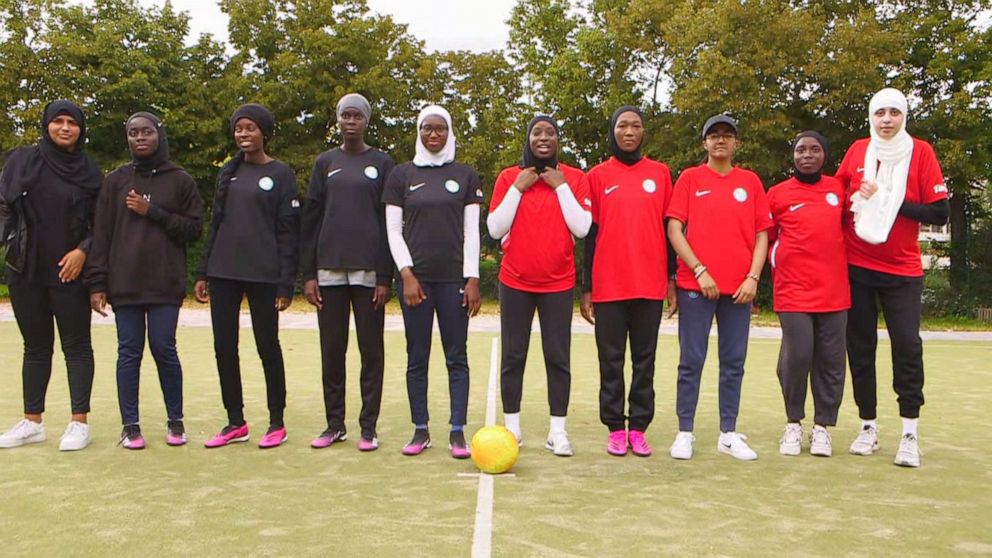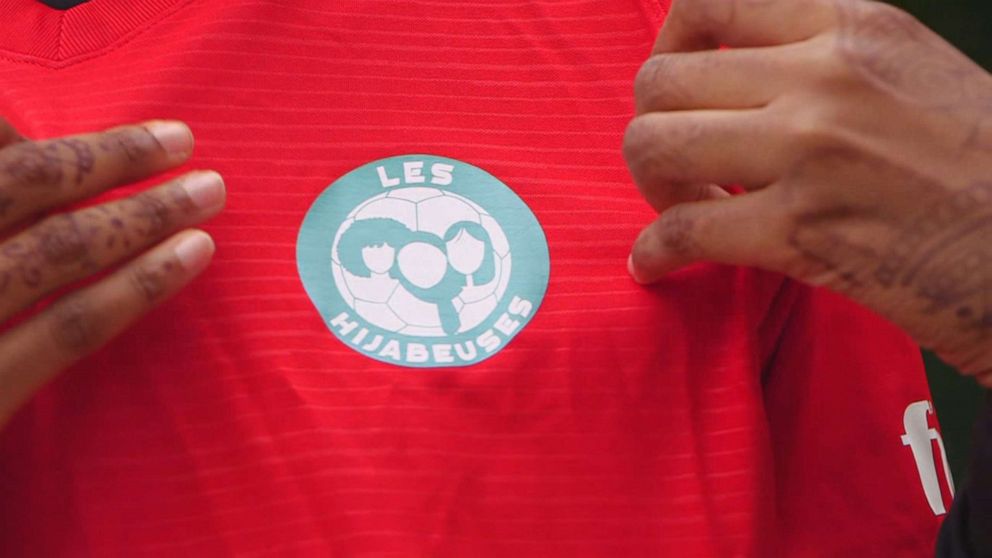'Hands off my hijab': French Muslims rail against ban on religious garb in soccer
"We are strong together and we will fight to the end," said Hawa Doucouré, 19.
Hawa Doucouré and her teammates on the Les Hijabeuses soccer team have a simple message to send while playing the game they love: "Hands off my hijab."
It's a message they hope is received not only by the French Football Federation, but the country's government as well.
"We are strong together and we will fight to the end," Doucouré, 19, told ABC News. "We will fight until every woman can play the sport that she wants to play, how she wants to play it."

The Hijabeuses, a collective of French soccer players, have spent the last year fighting to be included in official competitions. While FIFA, the world governing body for football, has permitted the Muslim veil on the field since 2014, the French Football Federation continues to ban it in club matches and international games, telling ABC News that it “promotes and defends the values of secularism, living together, neutrality and the fight against all forms of discrimination.”
Stream ABC News Live Prime weeknights at 7:00 p.m. and 9:00 p.m. ET at abcnewslive.com
The players' calls for change are part of a larger movement against the country's ban on religious symbols and garb, including niqabs and burqas. The latest controversy surrounds an amendment proposed earlier this year that bans minors from wearing a hijab in public.
France currently bans public workers and school students from wearing religious symbols, except at universities. The proposals that were also discussed included bans on Muslim mothers wearing hijabs on school trips and Muslim women wearing burkinis, or full-body swimsuits. They were eventually cut from the bill in one of the legislative rounds.
Rim-Sarah Alouane, a lawyer and researcher of religious freedom living in Toulouse, noted, "These conversations will keep on happening."
"There was a time when the French had unveiling ceremonies and you had a bunch of French women surrounding a Muslim woman wearing a headscarf celebrating the fact that she would remove her headscarf, usually by force, to say, 'Now you're welcome in our society,'" said Alouane.
There is currently no law in France specifically banning hijabs in sports competitions. The Hijabeuses said they have yet to hear back from the French Football Federation about why it has gone beyond the rule of law to restrict the wearing of hijabs in official sports competitions even as FIFA permits them.

The French government said it's passing these laws in the name of safety and secularism, and that the law strengthens its ability to adhere to principles of neutrality in government institutions. However, critics of the law argue that it will further stoke racism and discrimination in France, which is home to the largest population of Muslims in Western Europe. The country has seen an alarming rise in Islamophobia in recent years in part due to a rash of recent terrorist attacks by Islamic extremists and the subsequent strengthening of far-right politics.
Doucouré and her teammates are part of a movement of female athletes around the world challenging patriarchal norms to dress a certain way during competition.

At the Tokyo Olympics, Germany's women's gymnastics team wore full-length bodysuits instead of the more revealing leotards. Norway's women's beach handball team, meanwhile, wore shorts instead of bikinis at the Beach Handball EURO 2021 competition.
Germany’s women’s gymnastics team had complied with the existing rules under the International Gymnastics Federation, and thus faced no consequences. Norway’s women’s beach handball team, however, were fined 1,500 euros (about $1,700) by the Disciplinary Commission at the Beach Handball EURO 2021 for “improper clothing,” according to a statement from the European Handball Federation. The singer Pink later offered to pay the fine for the team.
Bilqis Abdul-Qaadir, a former Division I college basketball player, said that when it came to deciding between wearing Muslim garb or continuing to play basketball, she chose her faith. She went on advocate for Muslim women in sports and, in 2017, her efforts paid off when the International Basketball Federation amended its rules to allow head coverings -- while also noting that there were no health safety concerns in doing so.
Now, she says that not only are Muslim women allowed to wear head coverings, "but Jewish men can wear yarmulkes, and Sikh men who wear turbans can all participate. So, this rule change was big for just the greater good."

It's a struggle that Abdul-Qaadir said has been a "rough" part of her "journey" in her sporting career. Doucouré said times have changed for Muslim women.
"Nowadays, women are visible," said Doucouré. "We are not like the kind of hijabi they think we are. They have the idea of the hijabi that struggles in the house, who does housework, who don't have a life. When they see young women wearing it -- doing sports, educated -- they don't want to see that because it's a contradiction with the vision they have of the hijab."




